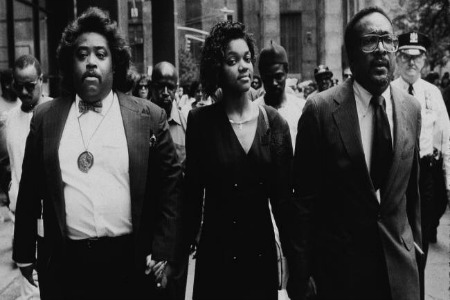
Twenty five years ago 15-year-old Tawana Brawley was reportedly found dazed and confused lying in a garbage bag with torn and burned clothing, feces smeared over her body and “KKK,” “ni**er,” and “b*tch” written on her torso, in Wappingers Falls, New York and taken to the emergency room.
Eventually, Brawley, through nods, shrugs and written notes, revealed to a black officer that she had been kidnapped and raped in a wooded area by white men over a four-day period.
Dutchess County Assistant District Attorney Steve Pagones was among the white men implicated in the horrendous act, as well as part-time police officer Harry Crist, Jr. who committed suicide on December 2nd, days after Tawana Brawley was found on November 28, 1987.
For nearly a year after Brawley was discovered, her story fueled New York City media coverage, even though Wappingers Falls is some 70 miles from New York City.
The story made national headlines as well, landing in People and other publications and dominating broadcast news programs thanks to Brawley’s trio of handlers that included Reverend Al Sharpton and attorneys C. Vernon Mason and Alton Maddox. In fact, the Brawley case propelled Sharpton to national prominence.
A grand jury investigation, with which Brawley and her team did not cooperate, dealt a crushing blow in late 1988 when it proclaimed in its findings, printed by the New York Times on October 7th, that “There was no medical or forensic evidence that a sexual assault was committed on Tawana Brawley.”
In essence, they found Brawley’s story to be untrue, a hoax even. Still, there are many who reject those conclusions and Brawley herself, even at a rare appearance in New York in December 1997 covered by the New York Times told a crowd “They write that it didn’t happen, that it’s a hoax….Then why are they here? Why are you listening to a liar, if I lie? They know something happened, and they know who did it.”
What may or may not have happened to Brawley, however, doesn’t erase the fact that black women have long been victims of sex crimes. So much so that black women activists like Rosa Parks were among the many who spoke out and fought against it. Before that fateful day in 1955 when Rosa Parks refused to give up her seat to a white passenger on that bus in Montgomery, she, as Wayne State professor Danielle L. McGuire reveals in her important 2010 book, At the Dark End of the Street, documenting incidents of black women who were indeed abducted and raped in the South, had championed Recy Taylor.
Taylor, a 24-year-old mother and sharecropper, was headed home following an evening service at Rock Hill Holiness Church in Abbeville, Alabama in 1944 when seven armed white men forced her into their vehicle and took her to a deserted grove of pecan trees where six of them raped her before leaving her on the side of a road. Rosa Parks was the NAACP representative who responded to the travesty in Abbeville.
It’s the Recy Taylors that lent so much credence to Brawley’s story. What may have seemed fanciful to a lot of white Americans was completely within the realm of belief for far too many black Americans.
The long historical record of sexual assault against black women by white women dating back to slavery is one of the primary reasons E.R. Shipp, a New York Times writer at the time who covered legal and was placed on the paper’s Brawley investigative team, believes that many black people so eagerly accepted Tawana Brawley’s story and, to this day, insist on its validity despite a grand jury’s findings.
Shipp, a black woman from Georgia, says that Brawley’s story resonated with many of her black supporters “because they knew of instances themselves or they had known stories that had been passed down of such outrage. It was more easily believable because of history but Tawana turned out to have been a flawed example of what had gone on throughout history when it comes to black women’s sexual assault and the willingness of the justice system to provide justice, to allow justice.”
Click here to read more
https://thegrio.com/2012/11/28/tawana-brawley-25-years-later-controversial-nyc-case-still-unsettled/
